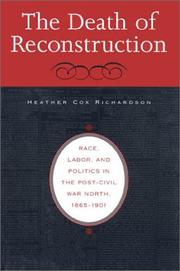
The death of Reconstruction
By Heather Cox Richardson
Subjects: Freedmen, Reconstruction (U.S. history, 1865-1877), Politics and government, Republican Party (États-Unis : 1854- ), Republican Party (U.S. : 1854- ), Freedmen, united states, African Americans, Affranchis, Arbeitsbedingungen, Republican party (u.s. : 1854-), Droits, Conditions économiques, Working class, Opinion publique, Südstaaten, Politique et gouvernement, Histoire, United states, politics and government, 1865-1900, Reconstruction (u.s. history, 1865-1877), Travailleurs, Reconstruction, Klassenverhoudingen, Sozialpolitik, Economic conditions, Public opinion, African americans, civil rights, Public opinion, united states, Relations raciales, Rassendiscriminatie, Economic history, Negers, Freed persons, Reconstruction (1865-1877), Civil rights, History, Noirs américains, Race relations, United states, economic conditions, 1865-1918, Ethnische Beziehungen
Description: "Historians overwhelmingly have blamed the demise of Reconstruction on the South and on white Americans' persistent racism. Heather Cox Richardson argues instead that class, along with race, was critical to Reconstruction's end. Northern support for freed blacks and Reconstruction weakened as growing labor interests critiqued the economy and called for government redistribution of wealth.". "Using newspapers, public speeches, popular tracts, Congressional reports, and private correspondence, Richardson traces the changing Northern attitudes toward African-Americans from the Republicans' idealized image of black workers in 1861 through the 1901 publication of Booker T. Washington's Up from Slavery. She examines such issues as black suffrage, disfranchisement, taxation, westward migration, lynching, and civil rights to detect the trajectory of Northern disenchantment with Reconstruction. She reveals a growing backlash from Northerners against those who believed that inequalities should be addressed through working-class action, and the emergence of an American middle class that championed individual productivity and saw African-Americans as a threat to their prosperity."--BOOK JACKET.
Comments
You must log in to leave comments.